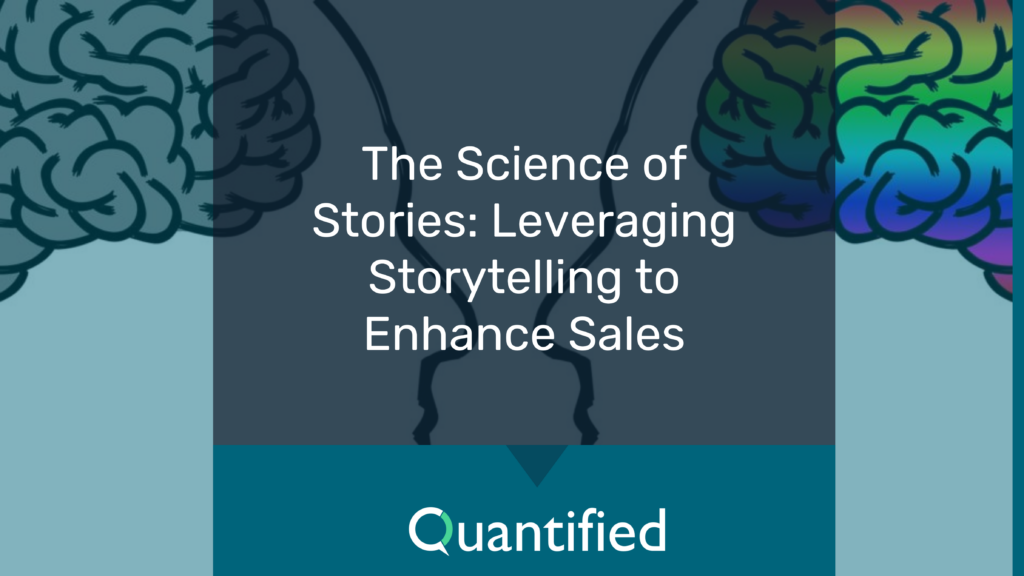Why Storytelling Still Wins
Your buyer won’t remember every product spec, but they’ll remember a story. That’s because stories are up to 22 times more memorable than facts alone. They activate multiple parts of the brain, making information easier to recall and connect with emotionally.
In a sales setting, that impact is even more powerful. A story can:
- Help a prospect picture themselves in the solution.
- Turn abstract ROI into something tangible.
- Build trust by showing, not telling.
But here’s the challenge: most reps don’t get enough safe, structured practice to master their stories. Storytelling under pressure is a skill, and skills are built with repetition and feedback.
That’s where companies like Bayer and Sanofi turned to Quantified. With AI-driven roleplay, reps had hundreds of practice conversations before ever meeting a customer—and they walked into the field not just trained, but confident.
Your Brain on Stories
Neurological engagement: When we hear a story, our brains simulate the events. This activates sensory and motor cortices, essentially letting us “experience” what we’re hearing. That immersion drives recall.
Chemical connection: Stories release oxytocin, the hormone linked to empathy and trust. That’s why you feel connected to characters in a movie—and why a prospect feels closer to a rep who shares a relatable customer story.
Salespeople who can trigger both cognitive and emotional engagement have a distinct edge.
Why Storytelling Drives Sales Outcomes
Top sellers don’t “wing it.” They tell purpose-built stories that show value, not just say it. Stories help buyers connect the dots between your solution and their world.
The best sellers deploy different types of stories at different points in the buyer journey:
- Success Stories
Short, punchy, and outcome-focused. They help prospects see what’s possible.
Example: “A pharma team preparing for launch used Quantified to simulate thousands of practice sessions and achieved a 97% mastery rate before the first call.” These stories provide proof and create urgency. - Customer Testimonials
Social proof builds trust. A statement like, “I wasn’t just certified, I was confident,” shows that others in a similar role found value. Testimonials blend credibility with relatability—two critical drivers of persuasion. - Case Studies
Longer narratives show the “before and after.” For example, Sanofi certified 500 reps on an RSV vaccine launch with Quantified, saving 250 hours of trainer time and improving proficiency 3–5x. Case studies satisfy more analytical buyers who want to see hard evidence.
Research backs this up: storytelling can increase perceived product value by 30%, boost win rates by 70%, and even accelerate sales by 185%.
Where Storytelling Fits in Sales
Stories aren’t just for pitches. They can strengthen almost any sales interaction:
- Financial Presentations: Instead of rattling off numbers, tell the story behind the trend. Highlight what challenges drove those results and how they were overcome.
- Quarterly Reports: Humanize performance by spotlighting the people behind the numbers. Share the story of a rep who turned around a tough territory.
- Product Demos: Instead of listing features, tell a narrative of how a real customer used them to solve a challenge.
- Sales Training: Stories of success and failure resonate more than slide decks. When Novartis used Quantified to accelerate onboarding, new hires not only passed certification at a 95% first-time rate—they remembered why the story of a product mattered.
- Customer Interactions: Weaving in stories from other customers helps prospects see themselves in the solution.
Crafting Effective Sales Stories
Not all stories land. To be effective, reps should:
- Identify the core message: Every story must reinforce a key selling point.
- Know the audience: Tailor examples to match the buyer’s context and pain points.
- Follow a narrative arc: Challenge → Solution → Outcome. Simple, but essential.
- Use relatable characters: A physician, a patient, a peer in the buyer’s industry. Someone they recognize.
- Be authentic: Overpolished stories backfire. Credibility depends on truth.
- Incorporate data: Pair emotional resonance with numbers. “Confidence improved” hits harder when backed by “97% mastery rate achieved.”
Using AI to Practice and Perfect Stories
Even when reps know what to say, they rarely get enough practice delivering it naturally. AI changes that.
- Personalized Narratives: Quantified’s AI personas mirror real buyers so reps can practice tailoring stories for different audiences.
- Objective Feedback: The platform measures clarity, confidence, and compliance, giving reps a mirror for improvement.
- Performance Metrics: Leaders get visibility into which stories land and which skills need work.
- Practice at Scale: At OpenLending, reps practiced handling tough objections 11 times each in simulation—far more than they ever would in live manager roleplay.
With Conversation Engine 3.0, reps don’t just “roleplay.” They practice in real-time, emotionally nuanced conversations that feel like the field.
Digital Storytelling Strategies
Beyond 1:1 sales calls, storytelling can scale across digital channels:
- Social Media: Share customer success stories in short, visual formats.
- Video: Record narrative-driven demos or testimonials for wider reach.
- Webinars: Teach through narrative, not just slides.
- Blogs: Share industry stories that build thought leadership and credibility.
Final Thoughts
Stories move people. But only if they’re practiced, personalized, and delivered with confidence.
The best sales stories don’t start in the field. They start in training. Bayer, Sanofi, Novartis, and others have proven that when reps use Quantified to rehearse stories at scale, they perform better when it matters most.
Request a demo to see how your team can master storytelling with the world’s most realistic AI roleplay.

The Science of Stories: Leveraging Storytelling to Enhance Sales
- A View from the Top: What Pharma’s L&D Leaders Are Prioritizing (and What They’ve Left Behind)
- Behind the Training, Episode 4: Steve Muccini
- The Pharma Compliance Problem Nobody Talks About
- What Pharma Gets Wrong About AI Training
- Quantified Named to 2025 Inc. 5000, One of the 50 Fastest-Growing AI Firms in the U.S.
